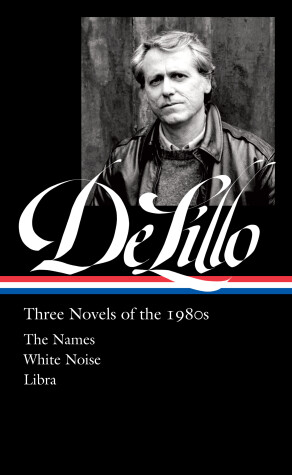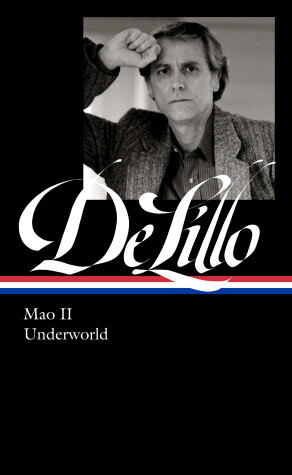LOA
2 primary works
Book 363
A definitive edition of a modern master: three essential works that reveal his incomparable style, dark humor, and uncanny sensitivity to the complexities of "living in dangerous times"
Includes White Noise, now a major motion picture starring Adam Driver and Greta Gerwig
This first volume in the Library of America Don DeLillo edition presents three indispensable novels from the 1980s, published here with new prefaces from the author.
The Names (1982) was DeLillo's breakthrough novel, a book that, as he reflects here, spanned a “broader expanse” than his earlier novels. James Axton, a “risk analyst” tasked with assessing dangers for his corporate clients from terrorism and other forms of political upheaval, uncovers evidence of ritual murders committed by a cult obsessed with ancient languages. The investigations of these crimes yields a profound series of meditations on identity, disconnection, and the nature of language itself.
Part campus satire, part midlife character study, and part fever dream of a hyperreality that has become uncannily familiar, the National Book Award–winning White Noise (1985) creates a terrifying yet wickedly funny portrait of a postmodern America that is still recognizably ours, a world where children chant brand names in their sleep, university professors “read nothing but cereal boxes,” and “you are the sum of your data.”
Three years in the research and writing, Libra (1988) offers a magnificent counter-history of the JFK assassination and a nuanced portrait of the president’s murderer. DeLillo has observed that “the novel, working within history, is also outside it, correcting, clearing up, finding balances and rhythms.” The result is a revelatory new depiction of a defining event in twentieth-century history.
Rounding out the volume are two hard-to-find essays directly related to the novels: “American Blood,” the 1983 Rolling Stone article that was DeLillo’s first effort to grapple with the JFK assassination and the welter of information and speculation the events of the killing and Oswald’s own murder by Jack Ruby; and “Silhouette City,” an assessment of extremist right-wing groups and the troubling presence of neo-Nazism in the United States.
Includes White Noise, now a major motion picture starring Adam Driver and Greta Gerwig
This first volume in the Library of America Don DeLillo edition presents three indispensable novels from the 1980s, published here with new prefaces from the author.
The Names (1982) was DeLillo's breakthrough novel, a book that, as he reflects here, spanned a “broader expanse” than his earlier novels. James Axton, a “risk analyst” tasked with assessing dangers for his corporate clients from terrorism and other forms of political upheaval, uncovers evidence of ritual murders committed by a cult obsessed with ancient languages. The investigations of these crimes yields a profound series of meditations on identity, disconnection, and the nature of language itself.
Part campus satire, part midlife character study, and part fever dream of a hyperreality that has become uncannily familiar, the National Book Award–winning White Noise (1985) creates a terrifying yet wickedly funny portrait of a postmodern America that is still recognizably ours, a world where children chant brand names in their sleep, university professors “read nothing but cereal boxes,” and “you are the sum of your data.”
Three years in the research and writing, Libra (1988) offers a magnificent counter-history of the JFK assassination and a nuanced portrait of the president’s murderer. DeLillo has observed that “the novel, working within history, is also outside it, correcting, clearing up, finding balances and rhythms.” The result is a revelatory new depiction of a defining event in twentieth-century history.
Rounding out the volume are two hard-to-find essays directly related to the novels: “American Blood,” the 1983 Rolling Stone article that was DeLillo’s first effort to grapple with the JFK assassination and the welter of information and speculation the events of the killing and Oswald’s own murder by Jack Ruby; and “Silhouette City,” an assessment of extremist right-wing groups and the troubling presence of neo-Nazism in the United States.
Book 374
The definitive edition of a modern master continues with 2 mid-career masterpieces, published here with new prefaces from the author
This second volume in the Library of America DeLillo edition collects two extraordinary novels he published in the 1990s, the peak of his career.
In the PEN/Faulkner Award–winning Mao II (1991), the celebrated novelist Bill Gray has withdrawn into seclusion, his everyday affairs managed by a pair of assistants. And yet within the protective solitude he has built for himself he still finds himself struggling—with pills and with a novel he can’t manage to complete. A visit from a Swedish photographer who specializes in author portraits spurs him to shake off his world-weariness, and soon the reclusive writer is embarked on an unlikely journey to help broker the release of a poet held hostage by terrorists in Beirut. Mao II, writes the critic Sven Birkerts, is “DeLillo’s strongest statement yet about the crisis of crises. Namely, that we are living in the last violet twilight of the individual, and that ‘the future belongs to crowds.’”
Underworld (1997), DeLillo’s magnum opus and a book that ranks among the greatest of twentieth-century novels, is a sprawling, ambitious, and moving panorama of the postwar American experience. It begins with a tour de force re-imagination of one of the great moments in sports: the decisive pennant game between the New York Giants and the Brooklyn Dodgers at the Polo Grounds in 1951, culminating in the now legendary “shot heard ’round the world” home run by Bobby Thomson. In DeLillo’s hands the excitement of the game is juxtaposed with something far more momentous, the announcement of the Soviets’ first atomic test—a coincidence that initiates a kaleidoscopic saga that is woven across more than four decades, shuttling back and forth through time and mixing fictional characters with historical figures such as Lenny Bruce and J. Edgar Hoover. The novel is at once a profound meditation on our contemporary condition and a deeply personal book for its author, drawing poignantly on his memories of growing up in the Bronx. “All of DeLillo is in Underworld,” writes Harold Bloom. “DeLillo’s sense of America, in the second half of the twentieth century, is achieved perfectly.”
Here is the ultimate gift for DeLillo fans and perfect introduction for readers interested in discovering or rediscovering a great American writer.
This second volume in the Library of America DeLillo edition collects two extraordinary novels he published in the 1990s, the peak of his career.
In the PEN/Faulkner Award–winning Mao II (1991), the celebrated novelist Bill Gray has withdrawn into seclusion, his everyday affairs managed by a pair of assistants. And yet within the protective solitude he has built for himself he still finds himself struggling—with pills and with a novel he can’t manage to complete. A visit from a Swedish photographer who specializes in author portraits spurs him to shake off his world-weariness, and soon the reclusive writer is embarked on an unlikely journey to help broker the release of a poet held hostage by terrorists in Beirut. Mao II, writes the critic Sven Birkerts, is “DeLillo’s strongest statement yet about the crisis of crises. Namely, that we are living in the last violet twilight of the individual, and that ‘the future belongs to crowds.’”
Underworld (1997), DeLillo’s magnum opus and a book that ranks among the greatest of twentieth-century novels, is a sprawling, ambitious, and moving panorama of the postwar American experience. It begins with a tour de force re-imagination of one of the great moments in sports: the decisive pennant game between the New York Giants and the Brooklyn Dodgers at the Polo Grounds in 1951, culminating in the now legendary “shot heard ’round the world” home run by Bobby Thomson. In DeLillo’s hands the excitement of the game is juxtaposed with something far more momentous, the announcement of the Soviets’ first atomic test—a coincidence that initiates a kaleidoscopic saga that is woven across more than four decades, shuttling back and forth through time and mixing fictional characters with historical figures such as Lenny Bruce and J. Edgar Hoover. The novel is at once a profound meditation on our contemporary condition and a deeply personal book for its author, drawing poignantly on his memories of growing up in the Bronx. “All of DeLillo is in Underworld,” writes Harold Bloom. “DeLillo’s sense of America, in the second half of the twentieth century, is achieved perfectly.”
Here is the ultimate gift for DeLillo fans and perfect introduction for readers interested in discovering or rediscovering a great American writer.

